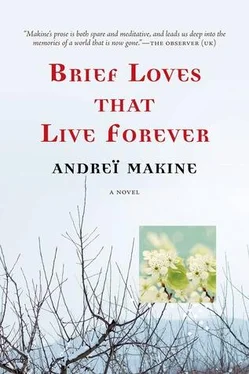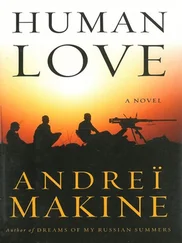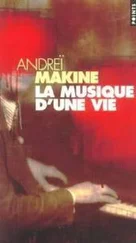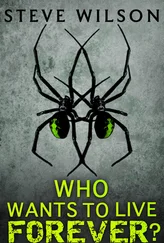And then time had gone by and on the threshold of being thirty, a formidable milestone for any young woman, she had come across a former fellow pupil from the orphanage, a bit of an oaf, who could not understand how wonderfully exciting her life was and how mind-blowing the project was that she and her friends were developing for their sorry country. And now, to cap it all, this backward-looking comrade has been stupid enough to ask her a ridiculous question that has nevertheless made her thoughtful. “Imagine your dream has come true,” he has said. “The queues disappear, people live in material comfort and travel all over the world the way retired people in rich countries do. But would this collection of benefits totally change the course of your life, give you a happiness unlike any other, the Red Riding Hood hat you used to sport at the orphanage?”
I know what I should say to Kira is just this: “The unique existence you’ve always been looking for is right here. In this dreamlike apple orchard, like nowhere else on earth. In this fine day poised between spring and summer. In this moment so singular it’s not even a part of your life. It’s a blip in time, a meeting, a fruitless one for you, with a man you’ll never love, me, and the specter of a man you do love. This will never happen again in your life. It’s here, your destiny and yours alone. If I were you I’d utter a long shout of joy in salute to the incredible madness of the regime you hate. For it’s given you this breathtaking flight through the beauty of this mass of white trees, trees, as if laden with snow, just as they were at that moment when I saw you in childhood, walking apart from the others, with your red hat on your head …”
I wake up, realizing I have dreamed those words, utterly true and equally impossible to share with her. Lying beside the water, her head resting on one arm, Kira is drowsing, too, and the expression on her face betrays a childish disarray. In a murmur I now address this sleeping beauty, this little girl of long ago, who shows through as she sleeps. “You’re right, Kira, these apple trees will never bear fruit. It’s a failed project, like my hope for an ideal city lived in by fraternal men, cured of hatred and greed … But just wait and see. Here, in the realm of this barren apple orchard, beside this half-finished fountain, a single apple is going to ripen, just one, an exception to nature’s logic, a fruit that’ll be here for us, with a flavor no one on earth has ever tasted. We’ll have to return in September …”
Kira stirs, opens her eyes, shakes her head, gives me a rather defiant look.
A droning noise fills the air, I recognize a helicopter flying low. It was doubtless this thundering clatter, a sound imprinted in every cell of my scalded body, that woke me just now. A little veil of clouds dulls the sun. A swift breeze passes through the tops of the apple trees, causes some petals to flutter down. Kira shivers, I see the reflection of her face shimmering in the mirror of the water, a strangely wan image, that of a bitter woman, weary of believing and being mistaken … She dresses and we leave.
At the moment when the central circle is about to be lost to view behind the avenue’s massed branches, I turn: a ray of sunlight picks out the imprint of our bodies on the sand.
A few years after our expedition to the model apple orchard, the project cherished by Kira’s friends came to fruition. Communism collapsed in a great tragicomic hurly-burly of palace revolutions, liberal promises, putsches, appalling economic pillage, edifying credos, and contempt for the old and weak.
In fact, History overtook this tardy generation of rebels, and the most exalted of their dreams soon appeared timid beside the savage violence with which Russia was reformed. The nice, cozy bourgeois society whose advent they hoped for found itself submerged under the muddy torrent of a capitalism of predators and mafiosi. By then most of the dissidents had already emigrated to America, where they could meditate on the unpredictable character of their country, quoting this old adage: “Russians never achieve their goals, because they always overshoot.”
Kira never knew that cataclysmic time. She died in the winter of the year following our brief encounter. As a rebellious militant, she would doubtless have preferred to perish in a camp or on the scaffold. But it was an ill-tended pneumonia. I would learn, much later, that she had contracted it when she went to visit her companion in his exile thirty miles from Moscow. This version, which I have always tried to believe in, had the advantage of allowing my childhood friend a heroic life, sacrificed on the altar of a great cause.
The man Kira was so in love with has been living in Berlin for several years now. I find his surname, Svistunov (“whistler”), with its comic hint of frivolity, hard to forget, an uncommon name. His profession, on the other hand, is not at all rare among the dissident intellectuals of his generation: he is a journalist, or more precisely a reporter who runs, as it were, an import-export business in ideas. Sometimes in Moscow, sometimes in Europe, he feeds the Western press with terrifying stories about the rebirth of dictatorship in Russia and the Russian press with reports on the perfidious designs of the Europeans and Americans …
We met recently and he was the one who told me, amid laughter, about this double game. He struck me as a lighthearted, jovial man, barely affected by his former exile. After Kira’s account I had pictured a pale martyr with a feverish look, his lips on fire with the truth. As I stared at him I was trying to work out the incredible physical resemblance he had to someone I was familiar with. Suddenly it came to me: Svistunov’s smooth, pink visage was not very different from the baby face of “the man who had known Lenin.” Yes, that sprightly and youthful apparatchik whose story we had listened to. Only a woman’s blind love could have endowed Svistunov’s humdrum face with an insurgent’s tragic nobility.
I talked to him about Kira. With an emotion that took me by surprise — I had not expected that day spent in the apple orchard to remain such a vivid memory.
“Kira … who? Wait, was she a blonde or a brunette? More auburn haired? … No. I’m sorry. I don’t remember her. Are you sure she was one of my … admirers? No. Not even the KGB will make me confess to it, ha, ha, ha!”
He seemed perfectly sincere and it was the one moment when his face took on an air of frankness, being otherwise overlaid with expressions that were always somewhat elusive and ambiguous, as required by his professional duplicity. No, he was not lying; he really did not remember the young woman who had idolized him.
“And your novel, that book you were writing in exile, Captives in Absurdia, was it?”
“Oh, that. That was just juvenile rubbish. Besides, after Solzhenitsyn and Shalamov, what is there to tell? They’ve said it all … And, as for girls, well, I was a superstud at the time. And another thing, you know what women are like. They take a great fancy to outlaws, persecuted people, exiles … So many came to see me, hordes of them, in that dump in the sticks where they made me live …”
He began to tell me about his extremely active and dissolute love life, in total contradiction to the grim picture his generation used to paint of the country crushed beneath the ideology’s puritanism. His voice shook with positively nostalgic vibrato. Yes, he missed that youth made up of clandestine meetings, dissident daydreams, and fleeting multiple love affairs, spiced with danger. I saw his eyes cloud over … Quickly he pulled himself together.
“So, shall we do it, our little interview? I should tell you straight away, this is for a Russian paper, so …”
Читать дальше









